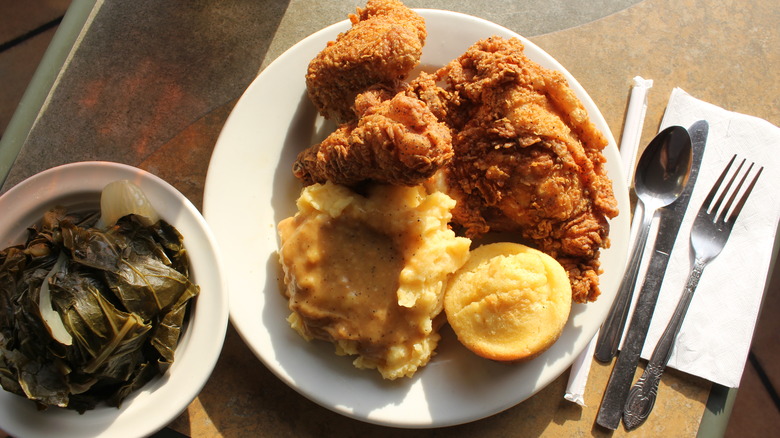Carla Hall's Soul Food Innovations Are Inspired By Her Yoruba Roots
As one of the most prominent chefs in the increasingly popular world of soul food, Carla Hall invites us to take a broader look at this cuisine that is rich in history but is often only taken at face value. Soul food has long been used to bring people together, build community in new places, and invoke memories of home, and these themes are central to Hall's work. Whether she's developing recipes for a cookbook, appearing on television, or supporting philanthropic efforts, she steers from the notion that "food connects us all" (via Hall's website).
Her approach to the cuisine strives to make soul food an accessible part of daily life — not just an occasional indulgence as it's often seen in America. With roots stretching back to Nigeria's Yoruba people and Bioko Island's Bubi people, Hall has studied the culinary traditions of her ancestors and incorporated them with the foods of her own childhood, which were often dictated by the vegetables her grandmother harvested that day. For her, soul food provides a framework for a balanced diet centering on diverse produce in day-to-day life, punctuated by the more indulgent celebratory meals we typically think of when we imagine soul food. Like her ancestors before her, Hall illustrates that soul food is as multifaceted and adaptive as any cuisine, ranging from simple to elevated, healthy to decadent — whatever a given occasion calls for.
Ancestral influences on modern cuisine
Learning more about African and African American culture — both through discovering her Yoruba and Bubi roots and serving as a culinary ambassador at the National Museum of African American History & Culture – inspired Carla Hall to use her platform to showcase and recontextualize soul food. Not only do people outside the community misunderstand it — but those within it sometimes do, too. She says, "I've spoken to black people and they're like, 'Oh, yeah, I can't eat soul food because it's going to kill me'" (via the New York Post).
What does that recontextualization look like in practice? Acknowledging that soul food is a conversation between European, Native American, and African cuisines while also looking back to the source and imagining how her ancestors' recipes would be translated into American kitchens today. Probably less fried food, more legumes like black-eyed peas, as well as corn and grains like millet and sorghum. Her approach to soul food balances popular celebratory dishes, expanding the context of the cuisine with everyday dishes that honor the history, flavors, and traditions of soul food. In doing so, she's working to make soul food a more integrated and nourishing part of people's lives.
Enhancing our perception of soul food
In America, soul food is largely understood as a monolithic cuisine — fried chicken, perfectly crispy shrimp, the best mac and cheese, and smothered pork chops. With roots in Western and Central African culinary traditions, soul food is an ethnic cuisine created by African Americans in the South. The cuisine is informed by the ingredients that were available to enslaved people and the cooking methods they used and was further shaped during the first great migration — when Black Americans were free and left plantations, relocating north to new cities and states. For Carla Hall, "I think that's when food started to change, and there was more fried foods, and there was more foods that were thought to be unhealthy — but there were also slaves who were trained chefs" (per Salon).
Hall's cuisine seeks to highlight the culinary accomplishments of black chefs, which is an incredibly diverse field. Her book serves up soul food in two categories — everyday recipes and celebration recipes — and beautifully showcases the wide range of nutritious ingredients that are fundamental in a cuisine that many consider inherently unhealthy — okra, legumes, whole grains, and collard greens, to name only a few. She's reclaiming soul food for her community, showcasing it as the complex cuisine it always has been, but so many fail to see it as — something that can be eaten every day rather than as an occasional treat.



